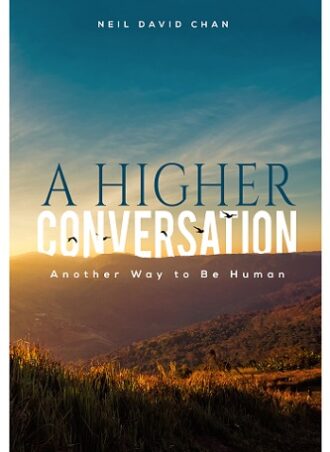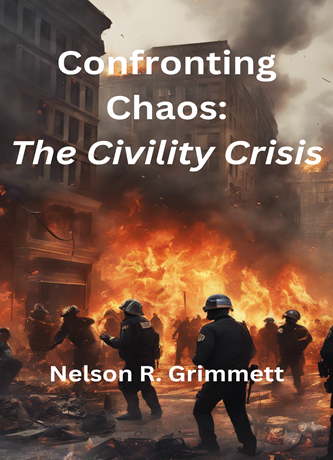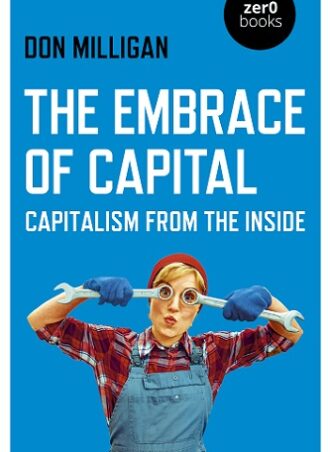
A Higher Conversation
A metaphilosophy that is out of this world. If you think ET blew your mind, then this will explode. Religion is dated, spirituality is fading, metaphysical is the 2030. Get futuristic now.

As Time Goes By
Nearing the end of his life, Old asks himself, “Does my life ultimately have any importance in any universal scheme? Am I just taking up space? Have I wasted the time given me? What effect have I had on others? Have I unknowingly, worse, knowingly, hurt others in some fashion? What’s my worth? These are playful existential questions with no pertinent answers for me. So I’m putting down my cane and picking up my pen. I’m going to sift through the sands of my time to see what I can discover through remembrance. Don’t expect any fancy writing. No playing with altered punctuation, or trying to be aesthetically clever, or poetic, or intellectual. Not here a Sedaris, or Saunders, or Atwood, or Yuknavich. Just me, squinting into some memorable windows in my life before they all fog.”

Confronting Chaos: The Civility Crisis
In “Confronting Chaos: The Civility Crisis,” Nelson dives deep into the heart of America’s current societal turmoil, pinpointing the root cause: the erosion of civility. With a blend of insight, compassion, and urgency, Nelson navigates readers through the complexities of this crisis, offering both analysis and solutions.

DEAD END SUMMER
Is equality essential for justice to prevail?
What happens if whole countries become lawless?
These are questions central to the plot that caused three men to move far away from each other, only to meet again one day, and face those existential questions head on.
Gavri, Chaim and Uzi were born as Israel became an independent country. They grew up in the Israel of the 1950’s, attended the same school, were involved with the same youth movement, and became close friends. However, thirty years later, in the summer of 1982, they find themselves as far away from each other as it is possible to be.

Egypt History And The Ancient Wisdom
The One Source of Truth nourishes the seeds of wisdom to sprout in each generation to remove the accumulated dust from the pyramid of totalitarian wisdom. The ancient wisdom of the archaic patriarch Thoth, Enoch, or Hermes, who founded civilization in ancient Egypt and left us the true philosophy of existence and creation.

Sky Ranch: Living on a Remote Ranch in Idaho
SKY RANCH is a memoir about a naive suburban woman who struggles to navigate an industrial farm and its commercial cattle enterprise. She survives dangerous white-outs during Rocky Mountain blizzards as well as terrifying flash floods in early spring. She learns to duck hunt, fly fish, and row a drift boat. SKY RANCH appeals to readers interested in Western culture, cattle and row-crop farming, hunting and fishing, and those who only dream of living on a ranch. It takes the reader on an exciting ride of terror, drama, and humor, giving us a look at what goes on behind the scenes at a rural ranch, many miles from civilization.

The Broken Promise of a Promised Land
Zionism . . . promotes the narrative that the Nazi holocaust is exceptional in human history – despite it being one of many holocausts from Native Americans North and South to Armenia and Rwanda. It sets Jews apart from the victims and survivors of other genocides instead of uniting us with them . . . Billions of US dollars flow annually to Israel to sustain the occupation and Israel’s sophisticated and brutal army. The war machine they fund is a leader in the global arms industry, which drains resources craved by a world in desperate need of water, food, health care, housing and education.

The Embrace of Capital
The “spectre of communism” which Karl Marx confidently summoned in 1848 is now nothing more than a ghostly and ghastly dream, without form or substance. This is because working people have developed a love-hate relationship with capitalism. They hate insecurity, inequality, and greed, and love civic and political freedom. They love mass consumption, and accept the logic of commerce. Barreling along through wars, revolutions, epidemics, and crises of all sorts, working people in their millions have consistently dumfounded and dismayed the left, by their refusal to countenance any alternative to the capitalist mode of life. We have to ask: Is it possible to reverse this reality, and once again talk of the necessity of communism?

The FACTS: Humanity’s Last Hope
Is Humanity’s Last Hope the most important book written since the bible? We think so, but that’s for you to decide. Try this. finish reading the FACTS, then answer this simple question.

Why We Hate: Understanding the Roots of Human Conflict
An insightful and probing exploration of the contradiction between humans’ enormous capacity for hatred and their evolutionary development as a social species Why We Hate tackles a pressing issue of both longstanding interest and fresh relevance: why a social species like Homo sapiens should nevertheless be so hateful to itself. We go to war and are prejudiced against our fellow human beings. We discriminate on the basis of nationality, class, race, sexual orientation, religion, and gender. Why are humans at once so social and so hateful to each other? In this book, prominent philosopher Michael Ruse looks at scientific understandings of human hatred, particularly Darwinian evolutionary theory. He finds the secret to this paradox in our tribal evolutionary past, when we moved ten thousand years ago from being hunter-gatherers to agriculturalists–a shift that paved the way for modern civilization. Simply put, as Ruse paraphrases, “our modern skulls house Stone Age minds.” Combining rigorous argument with an engaging and accessible style, Ruse makes frequent use of historical examples, examining the history of two World Wars, and the U.S. offensive against Iraq. He also gives many pertinent and up-to-date examples of prejudice, including the significance of Brexit and the systemic racism that lead to the Black Lives Matter movement. Ruse pays special attention to egregious cases of hatred, such as the treatment of Jews by the Third Reich, and to pressing contemporary issues, including the status of women. Ruse concludes with constructive suggestions for ways in which we might reconcile the contradictory aspects of our nature. Why We Hate will be of interest and value to a wide range of readers interested in the role of human nature in current events, as well as to readers interested in philosophy, the life sciences, social sciences (especially anthropology and archaeology), and beyond.
The Broken Promise of a Promised Land
Zionism . . . promotes the narrative that the Nazi holocaust is exceptional in human history – despite it being one of many holocausts from Native Americans North and South to Armenia and Rwanda. It sets Jews apart from the victims and survivors of other genocides instead of uniting us with them . . . Billions of US dollars flow annually to Israel to sustain the occupation and Israel’s sophisticated and brutal army. The war machine they fund is a leader in the global arms industry, which drains resources craved by a world in desperate need of water, food, health care, housing and education.